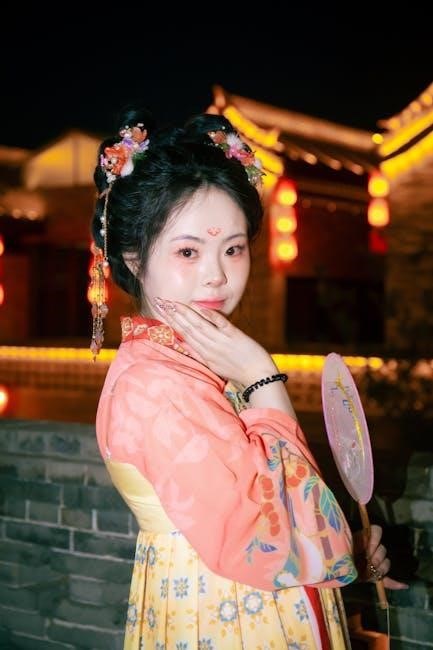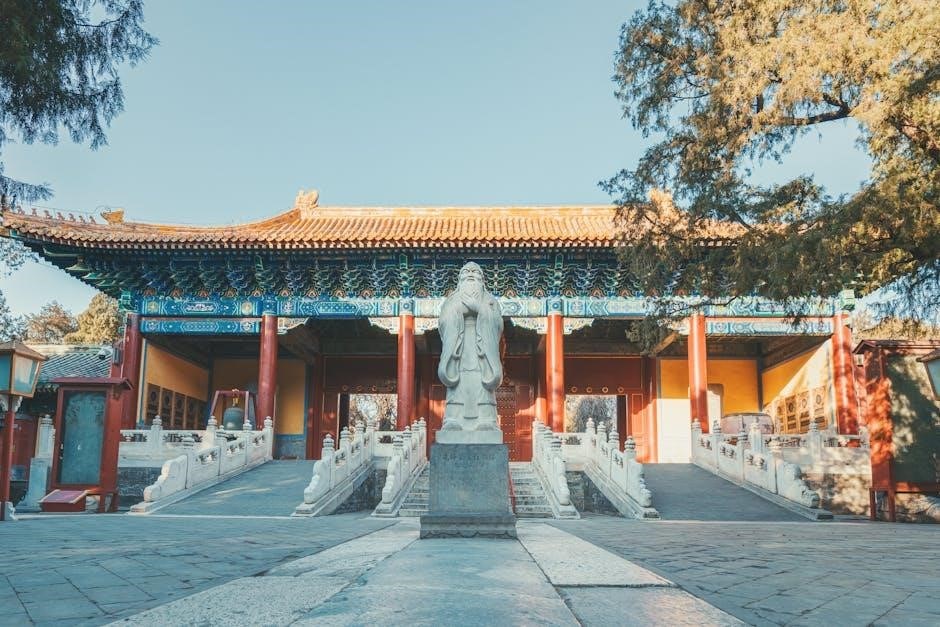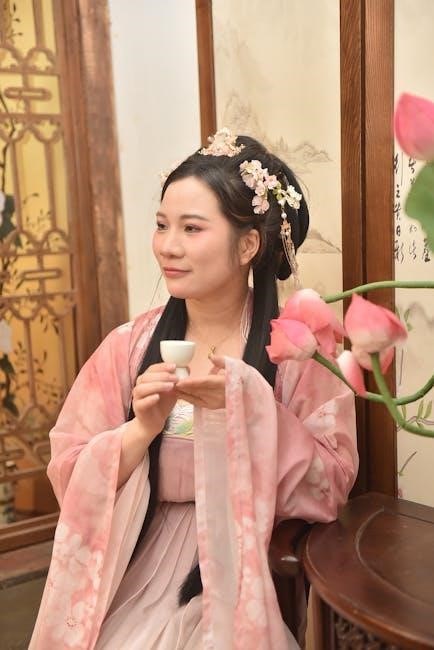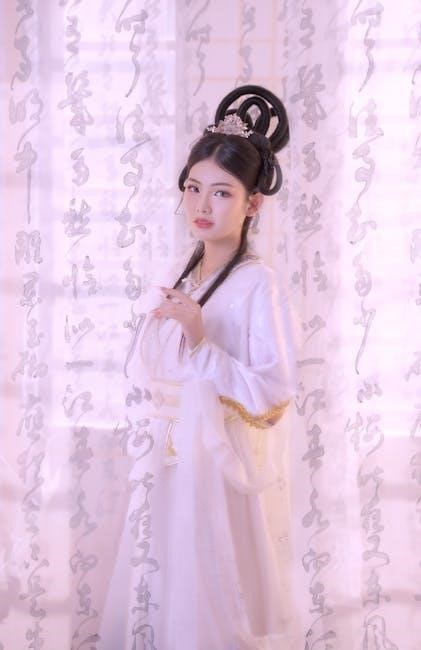Exploring foundational texts like the Analects and Daodejing, this anthology offers insights into Confucianism, Daoism, and other schools, providing a comprehensive understanding of classical Chinese thought.
Overview of the Key Philosophical Schools
Classical Chinese philosophy encompasses diverse schools of thought, each offering unique perspectives on ethics, governance, and human nature. Confucianism, led by Confucius and Mencius, emphasizes moral cultivation and social harmony through ren (benevolence) and li (rituals). In contrast, Daoism, inspired by Laozi and Zhuangzi, advocates for aligning with the natural order, or Dao, and embracing wu wei (non-action). Legalism, represented by Han Feizi, prioritizes strict laws and social control to maintain order. Mohism, founded by Mozi, promotes universal love and practical ethics. These schools, among others, are explored in depth in Readings in Classical Chinese Philosophy, providing a rich tapestry of ideas that shaped China’s intellectual history.
Historical Context of Classical Chinese Thought
Classical Chinese philosophy emerged during the Zhou Dynasty (1046–256 BCE), particularly flourishing in the Spring and Autumn (771–476 BCE) and Warring States (476–221 BCE) periods. This era of political fragmentation and social upheaval spurred intense intellectual debate, as thinkers sought solutions to restore order and harmony. Figures like Confucius, Mozi, and Laozi responded to the decline of Zhou authority by proposing ethical, political, and metaphysical frameworks. Their ideas were compiled into foundational texts, such as the Analects and Daodejing, later studied in anthologies like Readings in Classical Chinese Philosophy. This historical context shaped the diverse schools of thought that defined China’s intellectual landscape.
Confucianism
Confucianism, founded by Confucius, emphasizes ren (benevolence), yi (righteousness), and li (etiquette), as explored in the Analects. This anthology is a primary source for studying Confucian philosophy.

The Analects of Confucius
The Analects of Confucius are a cornerstone of Confucian thought, offering insights into his teachings on ethics, morality, and governance. This text, compiled by his disciples, contains dialogues, sayings, and ideas that emphasize ren (benevolence), yi (righteousness), and li (etiquette). The Analects are included in Readings in Classical Chinese Philosophy, providing a foundational understanding of Confucian philosophy. They highlight the importance of self-cultivation, social harmony, and the ideal of the junzi (gentleman). The anthology’s inclusion of the Analects makes it an essential resource for studying Confucianism and its enduring influence on Chinese thought and culture.
Mencius and the Development of Confucian Thought
Mencius, a prominent Confucian philosopher, expanded upon Confucius’s teachings, emphasizing the innate goodness of human nature. He introduced the concept of the “four sprouts” of morality, advocating for self-cultivation and benevolent governance. Mencius’s ideas, included in Readings in Classical Chinese Philosophy, highlight the importance of ethical leadership and social responsibility. His philosophy bridges Confucian ideals with practical political applications, offering insights into human potential and moral development. The anthology’s selection of Mencius’s works provides a deeper understanding of his contributions to Confucian thought, showcasing his enduring influence on Chinese philosophy and ethics.
Xunzi and the Nature of Humanity
Xunzi, a later Confucian thinker, proposed a contrasting view of human nature, arguing that humans are inherently selfish and prone to disorder. He emphasized the necessity of moral education, ritual (li), and social norms to cultivate virtue and achieve harmony. Xunzi’s philosophy, featured in Readings in Classical Chinese Philosophy, highlights the importance of external constraints to counteract humanity’s natural tendencies. His ideas significantly influenced Legalist thought, blending Confucian ethics with pragmatic governance. Xunzi’s works provide a nuanced understanding of human potential and the role of society in shaping moral behavior, offering a distinct perspective within the Confucian tradition.
Key Concepts: Ren, Yi, and Li
Central to Confucian thought, Ren (benevolence), Yi (righteousness), and Li (etiquette) form the moral foundation of human behavior. Ren embodies compassion, empathy, and kindness, urging individuals to cultivate harmonious relationships. Yi refers to moral righteousness, guiding actions according to what is ethically correct. Li, or propriety, involves adherence to social norms and rituals, ensuring order and respect within society. These concepts, explored in Readings in Classical Chinese Philosophy, emphasize self-cultivation and the pursuit of virtue. Together, they provide a framework for achieving personal and societal harmony, reflecting Confucian ideals of ethical living and responsible leadership.

Daoism
Daoism emphasizes harmony with nature through Wu Wei (non-action) and the pursuit of the Dao (the ultimate reality). Its teachings, explored in texts like the Daodejing, advocate for simplicity and balance.
The Daodejing and the Thought of Laozi
The Daodejing, attributed to Laozi, is a foundational text of Daoism. It explores the concept of the Dao, the ultimate reality and natural order governing the universe. Laozi’s philosophy emphasizes living in harmony with the Dao through Wu Wei (non-action), aligning oneself with the natural flow of life. The text critiques societal norms, advocating for simplicity and balance. Its teachings encourage individuals to embrace humility and transcend artificial desires, fostering a life of spontaneity and harmony with nature. The Daodejing remains a central work in classical Chinese philosophy, offering profound insights into ethical, metaphysical, and political thought.
Zhuangzi and the Philosophy of Freedom
Zhuangzi, a key Daoist philosopher, advocates for individual freedom and liberation from societal constraints. His teachings emphasize the importance of living spontaneously and in harmony with nature. Through parables and metaphors, Zhuangzi challenges conventional notions of reality, encouraging individuals to transcend rigid distinctions and embrace the fluidity of life. A central concept is the idea of wu wei (non-action), aligning oneself with the natural order to achieve true freedom. Zhuangzi’s philosophy also critiques the pursuit of material wealth and power, promoting instead a life of simplicity and inner peace. His ideas remain influential, offering a unique perspective on freedom and self-realization in classical Chinese thought.
Key Concepts: Wu Wei and the Dao
Zhuangzi’s philosophy centers on the concept of wu wei (non-action), which encourages individuals to align their actions with the natural order, or the Dao. The Dao, often translated as “the Way,” represents the ultimate reality and the source of all existence. Zhuangzi emphasizes living spontaneously and effortlessly, free from societal expectations and artificial distinctions. Wu wei is not about passivity but about harmonizing with the Dao to achieve a state of true freedom and authenticity. This philosophy critiques the pursuit of power and material wealth, advocating instead for a life of simplicity and inner peace. The interplay between wu wei and the Dao forms the heart of Zhuangzi’s teachings, offering a unique perspective on human existence and the natural world.

Legalism

Legalism, led by Han Feizi, emphasizes strict laws and punishments to maintain social order and control, contrasting with Confucian and Daoist approaches.
Han Feizi and the Philosophy of Law
Han Feizi, a prominent Legalist, advocated for strict adherence to law (fa) as the foundation of governance. His philosophy emphasized the necessity of clear laws, rewards, and punishments to maintain social order. In his view, human nature is inherently self-interested, requiring a structured system to ensure compliance. Han Feizi’s ideas were influential during the Qin Dynasty and contrasted with Confucian and Daoist approaches, which prioritized morality and natural order over legal frameworks. His writings, included in Readings in Classical Chinese Philosophy, provide insights into the Legalist vision of a centralized, law-based state.
- Emphasized law as the primary tool for governance.
- Advocated for strict punishments and rewards.
- Viewed human nature as self-interested, necessitating control through law.
Key Concepts: Fa and Social Order
Fa, or law, is central to Legalist philosophy, representing standardized rules enforced by authority to maintain social order. It emphasizes impartiality, ensuring equal treatment under the law regardless of status. Social order is achieved through strict adherence to fa, with rewards for compliance and harsh punishments for transgressions. This concept contrasts with Confucian reliance on moral cultivation and Daoist natural harmony. In Readings in Classical Chinese Philosophy, Han Feizi’s discussions on fa highlight its role in creating a stable, efficient state, reflecting the Legalist belief that structured governance is essential for human society’s functionality and prosperity.
- Fa ensures social stability through enforceable laws.
- Impartial application of law is crucial for justice.
- Legalism prioritizes order over individual moral development.

Mohism

Mohism, founded by Mozi, emphasizes universal love and the Will of Heaven, advocating for collective welfare and moral action guided by divine principles.
Mozi and the Philosophy of Universal Love
Mozi, the founder of Mohism, advocated for universal love and impartial care, emphasizing the importance of treating all people equally without discrimination. He believed that societal harmony could be achieved by aligning human actions with the Will of Heaven, which he saw as a moral and divine force. Mozi’s philosophy stood in contrast to Confucianism, as it rejected hierarchical relationships and instead promoted a utilitarian approach, prioritizing the well-being of the community over individual interests. His teachings also included critiques of war and excess, advocating for frugality and practical solutions to societal problems. Mozi’s ideas significantly influenced early Chinese thought, offering a unique perspective on ethics and social order.
Key Concepts: Ji and the Will of Heaven
In Mohist philosophy, the concept of ji refers to the moral standards or principles that guide human behavior, emphasizing the importance of aligning actions with ethical norms. The Will of Heaven, or tian zhi, is central to Mozi’s teachings, representing a divine moral authority that prescribes universal love and condemns partiality. Heaven is seen as an active, moral force that rewards the virtuous and punishes the wicked, ensuring justice in the world. These concepts form the cornerstone of Mohist ethics, providing a framework for understanding societal harmony and individual morality. Together, they underscore Mozi’s belief in a divine basis for ethical behavior and the pursuit of collective well-being.

Other Schools of Thought
Shen Dao emphasized power dynamics, while the Great Learning and Doctrine of the Mean explored ethical balance, shaping classical Chinese thought beyond mainstream philosophies like Confucianism and Daoism.
Shen Dao and the Philosophy of Power
Shen Dao, a lesser-known but influential philosopher, focused on the role of power and authority in governance. His ideas, included in the anthology, emphasize the central role of power in maintaining social order and achieving political stability. Unlike Confucianism or Daoism, Shen Dao’s philosophy centers on the pragmatic use of authority, advocating for a structured and disciplined approach to leadership. His teachings highlight the importance of law and institutional frameworks, offering a distinct perspective on governance that diverges from the ethical or naturalistic orientations of other schools. This philosophy underscores the practical aspects of power dynamics, providing insights into the mechanisms of control and order in classical Chinese thought.
The Great Learning and the Doctrine of the Mean
The Great Learning and the Doctrine of the Mean are foundational Confucian texts included in the anthology, offering insights into ethical cultivation and societal harmony. The Great Learning emphasizes education, self-cultivation, and the pursuit of moral excellence, advocating for personal growth as the foundation for a virtuous society. The Doctrine of the Mean explores the concept of balance and harmony, teaching individuals to navigate life’s challenges with moderation and ethical integrity. Together, these texts provide practical guidance for achieving moral equilibrium and fostering a harmonious social order, reflecting the enduring influence of Confucian thought on Chinese philosophy and culture.
Ethical and Political Dimensions
Classical Chinese philosophy explores moral cultivation, social harmony, and governance, emphasizing ethical conduct, natural order, and the balance between individual virtue and societal structures.
Confucian Ethics and Moral Cultivation
Confucian ethics emphasizes self-cultivation through virtues like ren (benevolence) and yi (righteousness). Mencius highlights the innate goodness of humans, advocating for nurturing moral potential through education and reflection. Xunzi, conversely, views humans as inherently flawed, stressing the need for ritual (li) and social norms to guide behavior. Both philosophers agree on the importance of moral development for achieving harmony in society. The Analects provide practical wisdom, urging individuals to embody virtues in daily life. Confucian thought bridges personal ethics with political order, envisioning a morally cultivated individual as the foundation of a just and stable society. This approach remains central to classical Chinese philosophy, offering timeless insights into ethical living and governance.
Daoist Ethics and the Natural Order
Daoist ethics, rooted in the Daodejing and Zhuangzi, emphasize harmony with the natural order, or Dao. The concept of wu wei (non-action) encourages aligning actions with nature, avoiding forced interference. Daoists advocate for simplicity, spontaneity, and rejecting artificial constructs. They critique excessive desire and societal norms, promoting a return to the natural state. The ideal is a effortless flow in life, mirroring the balance of the universe. Daoist thought challenges conventional morality, advocating for a holistic approach to ethics that prioritizes accordance with the natural world over human-made rules. This philosophy offers a unique perspective on living ethically, blending individual freedom with cosmic harmony. The Daodejing remains a central text, guiding followers to embrace the Dao as the ultimate ethical and metaphysical principle.
Legalist Political Philosophy
Legalist philosophy, rooted in the ideas of Han Feizi, emphasizes strict adherence to law (fa) as the foundation of social order. It advocates for centralized authority, clear legal codes, and harsh punishments to maintain control. Legalists reject moral relativism, prioritizing efficiency and stability over ethical considerations. The state, rather than individuals, is the primary focus, with rulers using law to ensure obedience and eliminate disorder. This pragmatic approach contrasts with Confucianism’s emphasis on morality and Daoism’s natural harmony. Legalism played a crucial role in shaping governance in ancient China, particularly during the Qin dynasty. Its principles remain influential in discussions of political authority and the role of law in society. Legalist thought is explored in-depth in Readings in Classical Chinese Philosophy, offering insights into its enduring relevance.
Comparative Analysis
Comparative analysis explores parallels and contrasts between classical Chinese philosophy and Western thought, highlighting unique perspectives on ethics, governance, and human nature through key texts and thinkers.

Classical Chinese Philosophy and Western Thought
The comparison between classical Chinese philosophy and Western thought reveals intriguing parallels and contrasts. While Western philosophy often emphasizes individualism and rational inquiry, Chinese thought focuses on communal harmony and ethical cultivation. For instance, Confucianism’s emphasis on ren (humaneness) and social roles contrasts with Western Enlightenment ideals of personal freedom. Similarly, Daoism’s concept of wu wei (non-action) aligns with Western ideas of spontaneity but differs in its rejection of forced intervention. Legalism’s focus on law and order mirrors Western political philosophy’s discussions of governance and authority. These comparisons highlight the unique contributions of Chinese thought to global philosophical discourse, offering fresh perspectives on ethics, governance, and human nature.
Common Themes and Differences
Classical Chinese philosophy shares common themes such as the pursuit of harmony, ethical cultivation, and the nature of humanity. However, significant differences exist in their approaches. Confucianism emphasizes ren (humaneness) and social rituals, while Daoism advocates for aligning with the natural order. Legalism focuses on law and authority, contrasting with Mohism’s universal love. These schools also differ in their views on human nature—Confucians and Mohists see potential for goodness, whereas Xunzi highlights inherent self-interest. Such diversity underscores the richness of Chinese thought, offering varied solutions to universal ethical and political challenges. These themes and differences provide a deeper understanding of the complexity and nuance within classical Chinese philosophy.

Resources and Further Reading
Essential texts like Ivanhoe and Van Norden’s anthology and translations of the Daodejing provide foundational insights into classical Chinese philosophy, offering comprehensive studies and interpretations.
Readings in Classical Chinese Philosophy (PDF)
Readings in Classical Chinese Philosophy, edited by Philip J. Ivanhoe and Bryan W. Van Norden, is a comprehensive anthology offering translations of key texts from the classical period. This third edition expands on previous versions, including new selections from Shen Dao and a revised translation of Han Feizi’s works. It also incorporates influential texts like the Great Learning and the Doctrine of the Mean, providing deeper insights into Confucian and Daoist thought. The anthology is an invaluable resource for students and scholars, featuring works by Confucius, Mencius, Zhuangzi, and Xunzi, among others. The PDF format allows easy access to these foundational philosophical writings, facilitating a thorough exploration of classical Chinese thought.
Other Key Texts and Commentaries
Beyond the anthology, other essential texts include Classics in Chinese Philosophy: From Mo Tzu to Mao Tse-Tung, edited by Wade Baskin, available in EPUB, AZW3, and PDF formats. This collection provides a wide-ranging exploration of Chinese thought, spanning from ancient to modern periods. Additionally, The Contemplative Foundations of Classical Daoism by Harold D. Roth offers a deep dive into Daoist origins and practices. These works, along with commentaries by scholars like Philip J. Ivanhoe, enrich the study of classical Chinese philosophy. They complement the anthology by offering diverse perspectives and in-depth analyses, making them invaluable for both scholars and enthusiasts seeking a broader understanding of Chinese philosophical traditions.
